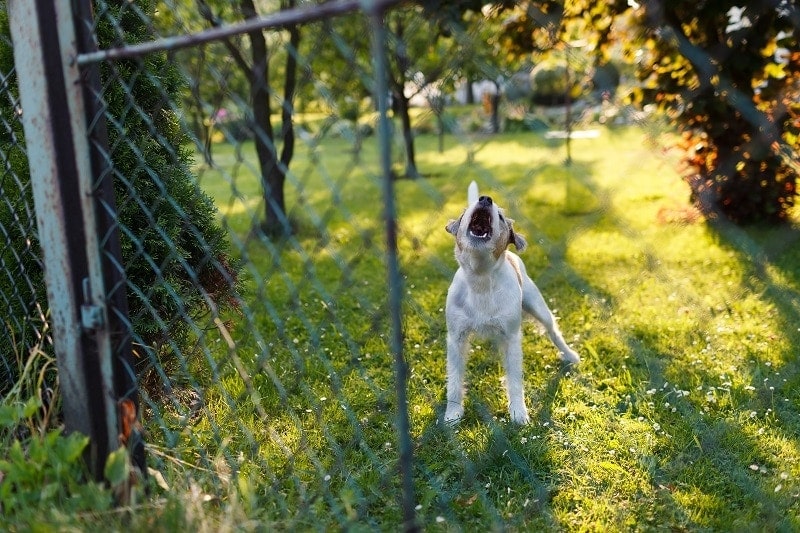How to Stop Your Dog from Barking at Neighbors: 7 Tricks that Work

Updated on

Barking is a dog’s natural way to communicate, and it is the only method they have of relaying their excitement, anxiety, fear, or other emotion. But having a dog that barks at the neighbors is annoying for them and embarrassing for you. It can even lead to some fairly major disputes.
But stopping a barking dog isn’t always easy. Many people make the mistake of shouting at their dog to stop, but this only encourages them. While shock collars and other devices may work, they vary from mildly cruel to inhumane.
Below are some methods that you can use to prevent your dog from barking every time your neighbor leaves or returns to their home.
Reasons Your Dog Barks
Before you can stop your dog from barking, you need to identify the cause of it. Once you know the root cause, you can employ different measures to modify their behavior.
- Protection – Your dog sees their yard, as well as the house itself, as their property. If they see a person or animal that they believe is encroaching on that territory, they will bark to let you know. They are warning you of what they believe to be impending danger.
- Fear – Your dog could be afraid of the sudden movement caused when a neighbor suddenly appears. They could have had what they believe was a negative experience with somebody that shares a similar trait to your neighbor. In any case, your dog will bark when they are startled or scared.
- Greeting – Barking isn’t necessarily a method of communicating negative emotions. Your dog barks when excited, happy, and playful, too. He could just be trying to say hello to your neighbor.
- Disgruntled – If your dog is not getting the stimulation he needs, he will act up in a variety of ways. Excessive barking could simply be a sign that he needs to get out and play, or requires more exercise. In this case, he is likely to bark at the neighbors, at any sound that he finds interesting, and for any of a range of other reasons.
The 7 Tricks to Stop Your Dog from Barking
Once you’ve determined the root cause of the barking, it’s time to take action. Try the following steps to help minimize barking and reduce the noise coming from your house.
1. Don’t Get Angry
It’s a common reaction when your dog does something you don’t like, but you shouldn’t shout at them or get angry. They believe that you’re barking along with them, and it reinforces the action. If they’re scared, and you “bark,” it gives them more reason to bark. They may perceive the neighbor to be even more of a threat.

2. Ignore the Barking
Your instinct might be to take action to stop the barking, but you should ignore it. Ignoring the barking shows your dog that they have no reason to be barking. Be patient. Carry on with what you were doing. Once they stop barking of their own volition, give them a treat and plenty of positive attention. They have, after all, completed the desired action and stopped barking.
3. Block the Cause
If your dog is barking to protect you or to greet the neighbors, try and remove the cause of the barking. You can’t shepherd every visitor and passer-by out of the way of your windows. But you can put up a slightly higher fence or grow a hedgerow that provides a physical barrier so your dog can’t see the neighbors. Alternatively, take them to another room where they can’t see the cause of their barking.

4. Provide Physical and Mental Stimulation
A tired dog is more likely to sleep and relax than to bark at the neighbors. Barking at noises outside could be a sign that it’s time to get outside and go for a walk. Alternatively, take them in the yard and throw a toy around or embark on your next training session. This not only takes their mind off the immediate cause of the barking, but if you wear them out, it will keep them quiet in the near future as well.
5. Sidetrack Them

Some dogs love to do tricks or perform for their owners. They might enjoy it because they love the attention or because they are treat motivated. In either case, if you can persuade them to do a trick, it will take their mind off the cause of their vocalization. This also enables you to reward them once they finish their trick, so they get rewarded for positive behavior, rather than scolded for poor behavior.
6. Teach Recall
Recall is one of the most important training commands available. It means that your dog will come to you when you call their name. This is useful when you are out and about. It’s beneficial when your dog is in the yard and you want them to come in. It is also useful when they are barking at neighbors. Walk away from the window and call them to you. When they come, give them a treat. Eventually, when they see or hear something that would make them bark, they will instinctively walk to the spot where you give them a treat. Always ensure that you reward them after they stop barking, however, and not before. Giving them a treat while they are still barking makes them believe that it is a desirable action.
7. Introduce Them to Your Neighbor
If all else fails, try introducing your dog to your neighbor. If your dog knows who your neighbor is, they will be less likely to bark at them. This only works if your neighbor is willing to meet your dog as well, but if they are, then you can let them come over on several occasions and meet your dog. Try having your neighbor give them treats so that your dog knows they aren’t a threat. Plus, you may also gain a pet sitter in your neighbor if you ever need one!
Related link:
- Why Does My Dog Bark at Me? 6 Reasons & What to Do About It!
- 7 Humane Ways to Keep Neighbor Dogs Out of Your Yard
Conclusion
A barking dog is an annoyance for you and your neighbors. It may also be a sign that your dog is experiencing some kind of stress; something that is motivating them to vocalize their emotions. Rather than shouting and yelling, and rather than using bark collars, you need to modify their behavior. Replace the negative barking with a positive action like performing a trick. Also, use it as an opportunity to determine whether they need more exercise or mental stimulation.
Featured Image Credit: Canon Boy, Shutterstock












